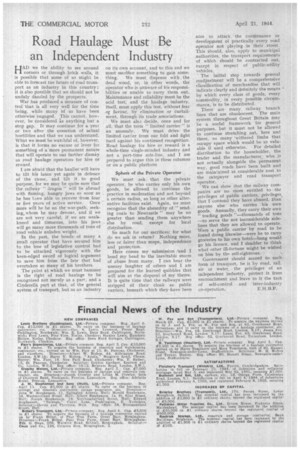Road Haulage Must Be an Independent Industry
Page 24

If you've noticed an error in this article please click here to report it so we can fix it.
HAD we the ability to see around corners or through brick walls, it is possible that some of us might be able to forecast the future of road transport as an industry in this country: it is also possible that we should not be unduly dazzled by the prospects.
War has produced a measure of control that is all very well for the time being, while many Of •us have been otherwise engaged. This cannot, however, be considered Is anything but a stop gap. It may continue for a year or two after the cessation of actual hostilities and that we can understand. What we must be watchful of, however, is that it forms no excuse or lever for something of a more permanent nature that will operate to our further dismay as road haulage operators for hire or reward.
I am afraid that the haulier will have to tilt his lance yet again in defence of the cause, and tilt it to good purpose, for we may be quite sure that the railway " dragon " will be abroad with flaming, hungry jaws so soon as he has 1,cen able to recover from four or five years of active service. Once
more will he be on the war-path, seeking, whom he may devour, and if we are not very careful, if we are weakkneed and timorous, into his jaws will go many more thousands of tons of road vehicle unladen weight.
In the past, the bonds of many a small operator that have secured him to the tree of legislative control had to be attacked vigorously with the keen-edged sword of logical argument to save him from the fate that had overtaken so many of his brothers.
The point at which we must hammer is the right of road haulage to be recognized not merely as a part, and a Cinderella part at that, of the general system of transport, but as an industry on its own account, and to this end we must sacrifice something to gain something. We must dispense with the dead wood, or, in other words, the operator who is unaware of his responsibilities or unable to carry them out. Maintenance and reliability must be the acid test, and the haulage industry, itself, must apply this test, without fear or favour, by 'elimination or curtailment, through its trade associations.
• We must also decide, once and for all, that the term " limited carrier " is an anomaly. Wo must drive the limited carrier from our fold and fight hard against his continued recognition. Road haulage for hire or reward is a whole-time single-minded industry and not a part-time side-line, and I am prepared to argue this in these columns or on a public platform
Sphere of the Private Operator We must ask, that the private operator, he who carries only his own goods, be allowed to continue the
practice in moderation and not beyond a certain radius, so long as other alternative facilities exist. Again, we must recognize that the absurdity of "sendjog coals to Newcastle " may be no
• greater than sending them anywhere else by road, except for local distribution.
So much for our sacrifices: for what do we ask in return? Nothing more, less or fairer than scope, independence and protection.
Here comes my submission ,'and I bend my head to the inevitable storm of abuse from many. I can hear the uneasy laughter of others and I am prepared for the learned quibbles that will aim at the disposal of my theme.
• It is quite time that the railways were stripped of their cloak as public carriers, beneath which they -have been able to attack the continuance or development of practically every road operator not playing in their street. This should, also, apply to municipal authorities, the transport requirements of which should be contracted out, except in respect of public-utility vehicles.
• • The initial step towards general readjustment will be a comprehensive classification of merchandise that will indicate clearly and definitely the means by which every class of goods, every commodity, in every possible circumstance, is to be distributed.
There are many railway branch lines that are obsolescent. The main system throughout Great Britain may be a useful framework for general purposes, but it must not be allowed to continue stretching out, here and there, so many 'withered limbs that occupy space which would be so valuable if used otherwise. For detailed distribution to the householder, the trader and the manufacturer, who is not actually alongside the permanent way, good roads have been built and are maintained at considerable cost to the ratepayer and road transport operator. . We can show that the railway companies are no more entitled to the privileges of public carriers; privileges. that I contend they have abused, than anyone else who carries his own goods. Annually, they carry their own " trading goods "—thousands of tons —to serve the not inconsiderable sidelines that they are allowed to operate. Were a public carrier by road to be found doing likewise—were he to carry groceries to his own hotel—bang would go his licence, and I shudder to think what other ill-fortune might be wished on him by thP self-righteous. Government should accord to each form of transport, be it by road, rail, air or water, the privileges of an independent inciustiy, protect it from encroachment and leave to it the task of self-control and • inter-industry
co-operation. E.H.B.P.




















































